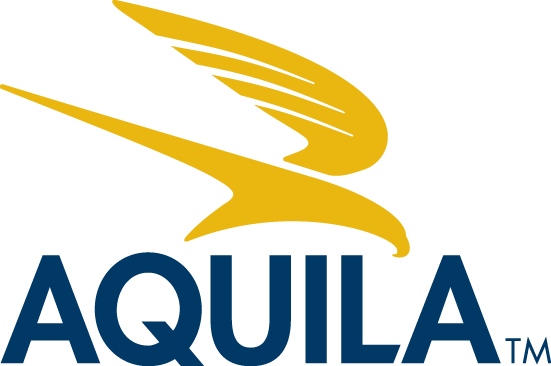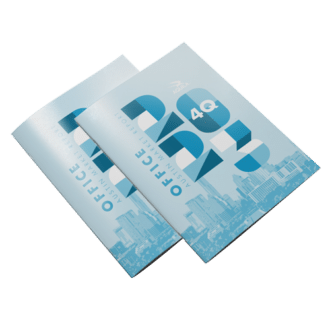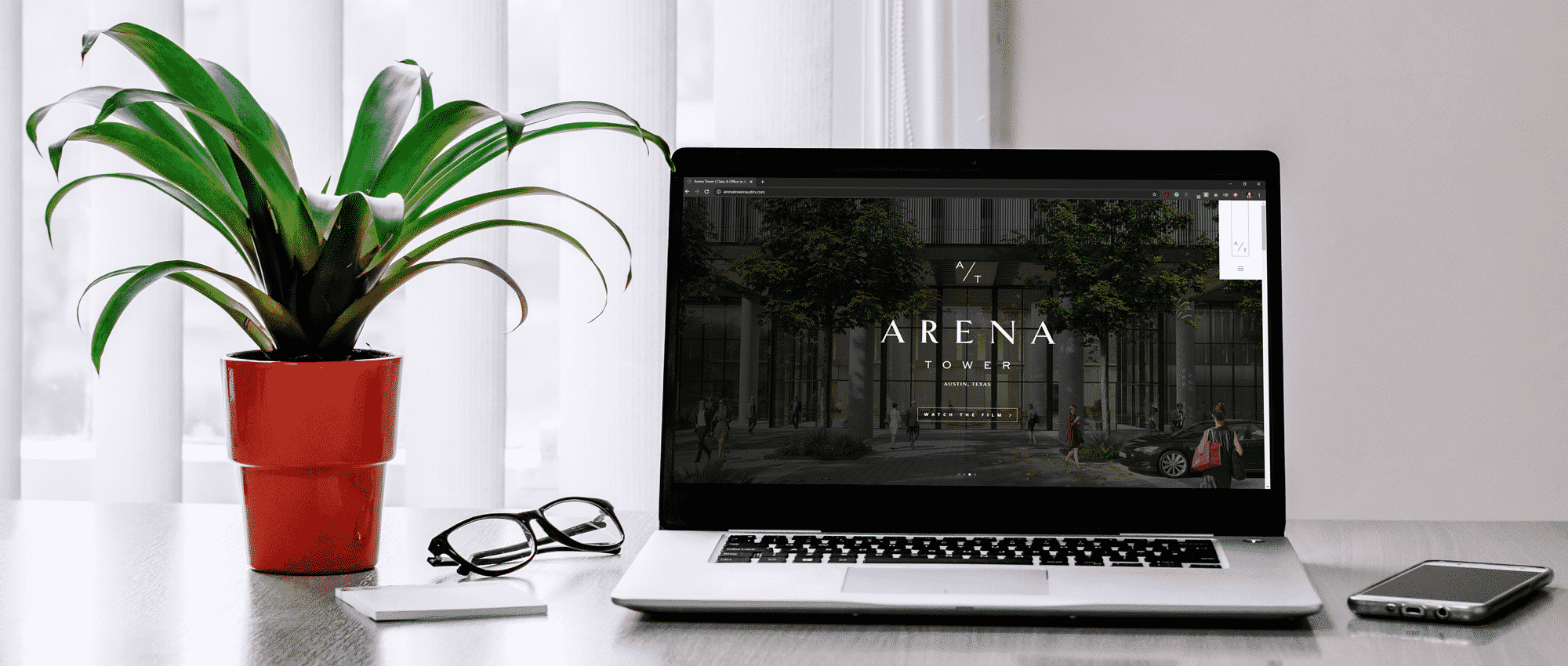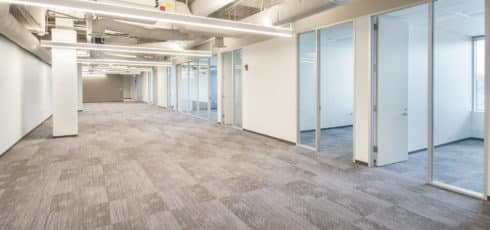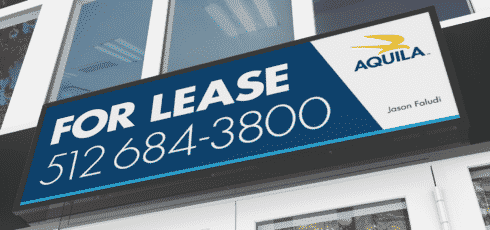This article was originally published in February 2020 and will not be updated. Please contact us if you have specific questions regarding the information in this article.
When marketing a commercial property, most brokerage firms have a standard playbook that includes a property flyer, leasing sign, and email campaign. This minimum standard that has been set for marketing commercial properties works in many cases, but these days property owners have realized that getting their properties noticed in this competitive marketplace may take a more customized approach to branding and marketing.
Read Next: The Ultimate Guide to Commercial Real Estate Marketing
As you look at the landscape of commercial properties being marketed in Austin today, more and more are taking their properties to market with a robust brand identity in place.
In this article we’ll answer the top questions property owners have about creating a unique brand identity for commercial properties, including:
- What is a brand identity?
- When does it make sense to have a custom brand for my commercial property?
- When does it NOT make sense to have a custom brand for my commercial property?
- What is the process for beginning a custom brand project for my commercial property?
- What is usually included in a brand identity package?
- Who pays for it and how much does it cost?
Read Next: 6 Best Branding Agencies for Commercial Real Estate Property
What Is Brand Identity?
Many people think that a brand is simply a logo, but it actually encompasses quite a bit more. A brand identity includes both the visual elements of a brand, such as a logo, typeface, and colors, as week as the unique messaging and value proposition that helps to distinguish that brand in consumers’ minds.
A brand identity is made up of what your brand says, what your values are, how you communicate your product, and what you want people to feel when they interact with it. Essentially, your brand identity is the personality of your business and a promise to your customers.”
A unique brand identity is not a requirement for effectively marketing a commercial property, but can certainly help under the right circumstances. Here is an example of a commercial office property that has a unique brand identity versus one that doesn’t:
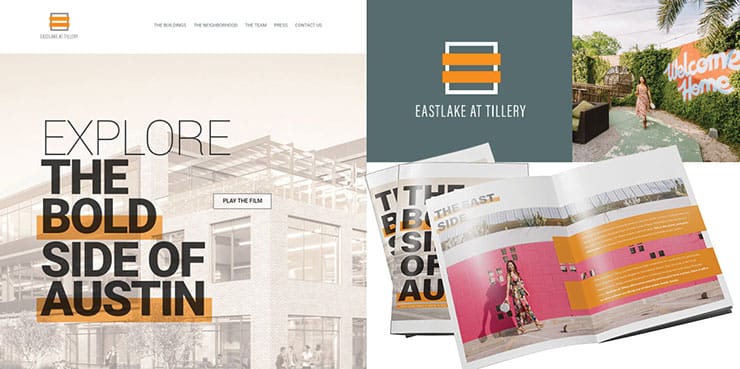
Eastlake at Tillery has a custom brand identity with a logo, brand guidelines and colors, a website, a custom brochure, and more.
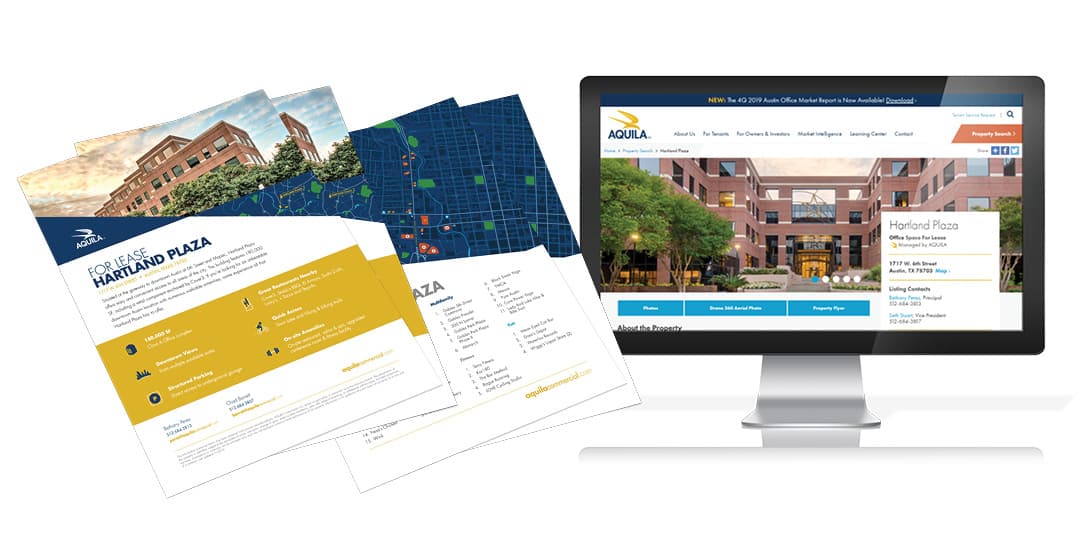
Hartland Plaza does not have a unique custom brand identity. This property has a standard flyer, online listing, and more.
The property with the custom brand obviously stands out, so you might think that it’s always a good idea to pursue creating a brand identity for your commercial property. But in truth, whether or not it’s worth it to create a unique brand identity for your property depends on a multitude of factors which we will explore next.
When Does It Make Sense to Have a Custom Brand for my Commercial Property?
Whether or not it makes sense to have a custom brand identity for your commercial property usually depends on the property type and size of the property as well as the owner’s marketing goals.
Size & Type of Property
In general, the bigger a property or building is, the more likely it is to need a unique brand identity. Developers and owners of large mixed-use projects, retail centers, and multi-building office and industrial campuses generally create a custom brand identity.
Custom brands are not as common amongst individual industrial properties, land, and smaller neighborhood retail and strip centers, though there are sometimes exceptions.
It’s more of a toss-up whether or not you’ll see a custom brand for an individual office building or not. You’re more likely to see a custom brand for existing office buildings larger than 100,000 square feet or sometimes smaller office buildings that are being newly developed or re-developed.
Read how AQUILA successfully crafted a brand for a new office development and landed a full-building tenant in our 801 Barton Springs case study.
Marketing Goals & Budget
Whether or not you choose to pursue creating a unique brand identity for your property or not also depends on your marketing goals and budget. Common reasons for establishing a brand identity include:
- New developments that need to establish an identity in order to sell something that doesn’t yet exist
- Existing properties that have undergone a major renovation
- Existing properties that have changed ownership
- Existing properties that want to break free of an outdated stigma
Custom branding is commonly seen in new developments because it’s important for a new project that doesn’t have recognition in the market to create identity and cache in order to lease up. These new developments also typically have a healthy marketing budget.
Often, we see older properties get new or updated brand identities following major property renovations. Smart asset managers will budget for branding and marketing initiatives alongside other capital improvements so they have the horsepower to promote the changes as they are in progress or when completed.
Additionally, sometimes properties are treated to new or updated brands when changes in ownership or leasing teams occur. And in some drastic cases, properties are given new or updated identities when they have a negative stigma in a market in an attempt to wipe the slate clean of past perceptions.
Examples of properties that have their own brand identity in Austin include:
- 7700 Parmer – 7700 Parmer is a 900,000-square-foot, multi-building office campus in Northwest Austin. The campus had previously been a single-tenant corporate campus that underwent conversion to a multi-tenant opportunity. It has a unique logo, its own website, and matching collateral.
- Pennybacker Commons – Previously called The Millenium, Pennybacker Commons is a 136,000-square-foot office building in Austin’s Northwest submarket. In 2019, the building underwent major renovations, got new ownership, and, in turn, was given a new name and brand identity to redefine the building’s perception in the market. It has a custom website, distinct messaging, and custom-branded marketing materials.
Read Next: Guide to Building an Effective Marketing Center for Your Commercial Property
When Does It Not Make Sense to Have a Custom Brand?
Since brand identity projects can be long and may require a significant amount of funding, not every owner wants to or should create a custom brand identity for its property. In many cases, a brokerage firm’s standard brand materials can be sufficient for successfully marketing a property.
Examples where custom branding might be a waste of time or money include smaller Class A properties, Class B properties, or value-oriented properties.
Examples of properties that don’t have custom brand identities and are well served by utilizing standard templates include:
- Eastside Village – A 95,000-square-foot office building located in Austin’s Eastside, Eastside Village is within walking distance of many amenities and is in a great location. The standard marketing materials have been successful for this property, and the property has remained 100% leased for the majority of its time on the market.
- Kyle Crossing Business Park – A 40-acre industrial business park located in Kyle, Texas, Kyle Crossing is in a great location and in shell condition, ready for tenants. Because this is industrial space in great condition, custom branding is not necessary.
- Monterey Oaks – Monterey Oaks is a multi-building, single-story value office property in Southwest Austin. A value property that consistently performs well, a custom brand for Monterey Oaks isn’t worth the money.
In some cases, if an owner is new to a market or lacks brand recognition amongst the brokerage community, using the brand of the leasing brokerage can be an asset in marketing the property if the brokerage has a good reputation. Using their standard templates can sometimes be a smart approach since a property will be getting implied credibility via the brokerage firm.
Read Now: What Marketing Materials should a Commercial Leasing Firm Provide?
What Is Usually Included in a Property Branding Package?
When creating a custom brand for a commercial property, a property branding package can be as customized as the owner or brokerage team would like. In most cases, a basic identity package from a branding agency will include a custom logo, color palette, messaging, and a basic brand guidelines document.
Sometimes once this basic brand identity & strategy is established, your brokerage’s in-house marketing team can execute collateral based on these standards. More often, we recommend clients utilize the branding agency to see the project through and create all the desired collateral.
Here is an example of the types of services and collateral we often ask branding agencies to include in their bids:
| Branding & Messaging | Marketing Collateral | Signage Design | Digital Assets |
|
|
|
|
Depending on your marketing goals for your property and your budget, you may choose to execute some or all of these items.
Read Next: Things That Should Be on Your Property Website
How Much Does It Cost and Who Pays for It?
When considering whether or not a custom brand identity makes sense for your property, it’s important to make sure you have considered the cost and whether or not you have room for it in your budget.
Creating a custom brand, especially when utilizing an outside branding agency, is typically a fee that you will pay outside of your leasing commissions. In most cases, a developer or owner will pay the agency directly.
In some cases, a brokerage may offer these services via their in-house marketing or design team. Whether or not they charge a fee for these services varies.
The cost of a custom brand identity can vary widely. It depends on a few things, namely the size and pricing structure of the branding agency you choose and the number of deliverables you have included in your scope of work.
In our experience working with firms in Austin, Atlanta, Dallas, and Los Angeles, basic brand identity and strategy packages which include a custom logo, color palette & typefaces, brand guidelines and messaging can range from $1,500 to $15,000 depending on the agency.
For full campaigns, with the full list of collateral activations listed above, we’ve seen projects range from $25,000 to upwards of $100,000.
It’s important to note that these ranges are only for the services listed above for brand identity, strategy, and collateral design. A full marketing budget will include additional expenses such as video, professional photography, renderings, and events. For more information on what it costs to market a commercial property, read our article How Much Does It Cost to Market a Commercial Property?
What Is the Process for Beginning a Custom Brand Project for My Commercial Property?
If you are interested in creating a custom brand for your new property or rebranding your existing property, it’s best to talk to your leasing brokers. It’s important to hire a project leasing broker before kicking off a branding project as your leasing team should be involved in creating the key messaging and helping your agency understand your property’s unique value proposition in the market. Reputable leasing firms generally have an in-house marketing team that can help manage a branding project for you.
Read Now: 5 Questions You Should Ask About Your Leasing Firm’s Marketing Team
At AQUILA, our marketing team has helped numerous clients navigate the branding/rebranding process from inception to completion. In our experience here is what the process typically looks like:
- Goal Setting & Budget Planning – Our in-house team works with ownership and leasing brokers to determine a property’s marketing goals and budget. During this phase, we determine if a custom branding project makes sense or not and identify which collateral pieces will be needed.
- Vendor Selection – This process starts with creating a Request for Proposal to solicit bids from various vendors. Once we have proposals and pricing, we work with the client to narrow it down to two to three firms to interview. After interviews, the team works together to choose a partner to move forward with, and we get contracts signed and deposits paid to begin work.
- Discovery – The branding agency that has been selected will conduct a discovery call or workshop to align all stakeholders and understand the property’s value proposition. This often involves a visit to the property. Generally at the end of discovery an agency will present a document called a Creative Brief which presents the findings from discovery, puts forward key messaging for the property, and determines the direction for creative assets.
- Naming – If project naming is part of the exercise this will typically be presented and decided upon first.
- Creative – Next, the agency will present logo options. Some agencies also present other collateral along with logo options so you can get an idea of how that identity will look applied across a variety of materials. After a direction for visual identity is chosen, the agency will move forward on executing the rest of the print and digital collateral agreed upon in the scope of work.
- Campaign Kickoff – Once the brand identity is established and supporting collateral such as signs, brochures, email templates, websites, etc. are created, your brokerage firm will establish a campaign to distribute your property materials and build awareness in the market.
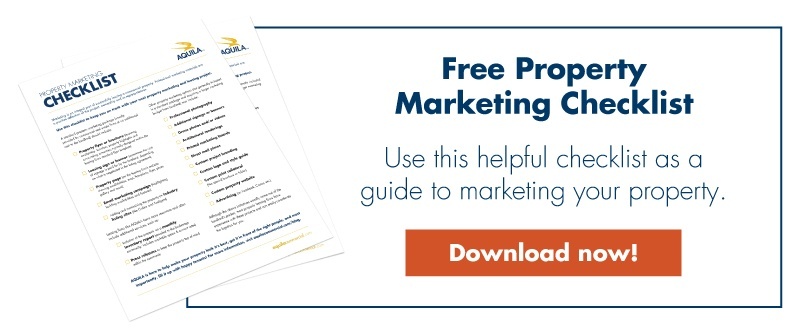
If you’re ready to take your property marketing to the next level, get in touch with one of our project leasing brokers today.

